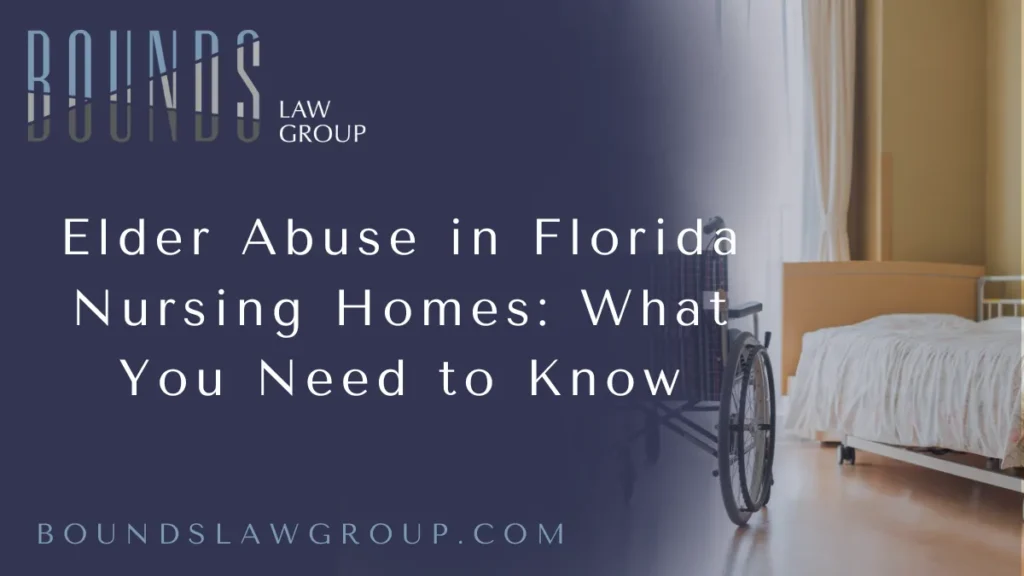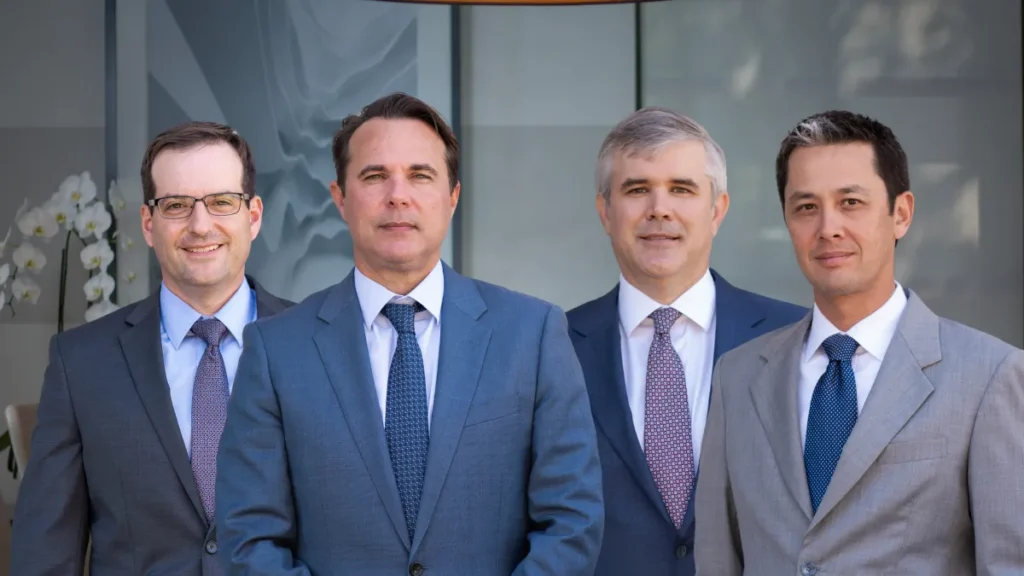
Florida nursing home abuse is a serious issue affecting the elderly in long-term care facilities across the state. As residents in nursing homes and assisted living facilities are often vulnerable due to physical or cognitive impairments, it is crucial to recognize the signs of abuse and take action to protect your loved ones. If you suspect abuse or neglect, Bounds Law Group is here to help. Contact us now at 877-644-5122 or complete the free case evaluation form for expert legal assistance.
What is Florida Nursing Home Abuse?
Florida nursing home abuse encompasses any physical, emotional, or financial harm inflicted on a resident within a nursing home or assisted living facility. Abuse can take many forms, including physical violence, neglect, sexual assault, financial exploitation, and emotional abuse.
Signs of Florida Nursing Home Abuse
Physical Signs
The most obvious indicators of Florida nursing home abuse are physical signs, such as unexplained bruises, fractures, or burns. These injuries may be a result of direct physical violence or improper handling of the resident.
Emotional and Psychological Signs
Residents may exhibit anxiety, depression, or withdrawal from social interaction, which can be symptoms of emotional or psychological abuse. Emotional abuse often involves verbal threats, humiliation, or intentional isolation.
Financial Exploitation
Financial abuse in nursing homes can take the form of theft, fraud, or coercion. This can include unauthorized withdrawals from bank accounts, changes to a resident's will, or using their funds without permission.

Common Types of Florida Nursing Home Abuse
Physical Abuse
Physical abuse includes acts of violence such as hitting, slapping, or pushing a resident. It can also involve improper use of restraints or overmedication, which may cause harm to the resident.
Neglect
Neglect is the failure to provide essential care or meet the basic needs of residents, such as feeding, bathing, and providing medical care. Neglect can lead to serious health complications, including infections, dehydration, or malnutrition.
Sexual Abuse
Sexual abuse in nursing homes involves any form of non-consensual sexual contact or behavior. This is one of the most traumatic types of abuse and can result in both physical and emotional harm to the victim.
Financial Abuse
Financial abuse can occur when nursing home staff or even other residents exploit a resident's assets or manipulate them for monetary gain. This can include identity theft, misuse of credit cards, or coercion into signing over property.
Florida Nursing Home Abuse Laws
State Regulations and Enforcement
Florida has specific regulations in place to protect nursing home residents from abuse and neglect. These laws require that all nursing homes and assisted living facilities adhere to strict standards of care. The Florida Agency for Health Care Administration (AHCA) is responsible for enforcing these regulations and investigating complaints of abuse.
Federal Laws Protecting Nursing Home Residents
The federal government also enforces laws to protect residents in nursing homes. The Nursing Home Reform Act requires facilities that receive federal funding to meet certain quality standards in care. This includes providing adequate staff, ensuring safety, and addressing complaints promptly.
Steps to Take if You Suspect Florida Nursing Home Abuse
Document the Signs
If you suspect Florida nursing home abuse, the first step is to document any signs of abuse. Take photographs of injuries, keep a detailed log of conversations with staff, and note any changes in the resident’s behavior or health.
Report the Abuse
Report any suspected abuse to the nursing home management immediately, as well as the appropriate authorities. In Florida, you can contact the Agency for Health Care Administration (AHCA) or the Department of Elder Affairs (DOEA) to file a formal complaint.
Seek Legal Help
If you believe your loved one is a victim of nursing home abuse, it’s crucial to contact an experienced attorney at Bounds Law Group. We specialize in representing victims of nursing home abuse and can help guide you through the legal process. Our legal team will assist you in seeking justice and securing compensation for any harm your loved one has suffered.
State and Federal Oversight in Preventing Nursing Home Abuse
Florida State Oversight
The Florida Agency for Health Care Administration (AHCA) is responsible for monitoring and regulating nursing homes and assisted living facilities throughout the state. AHCA conducts regular inspections and investigates any complaints related to Florida nursing home abuse. These inspections help ensure that facilities maintain adequate care standards and comply with state laws.
Federal Oversight
At the federal level, the Centers for Medicare and Medicaid Services (CMS) plays a critical role in overseeing nursing homes that receive federal funding. CMS enforces regulations outlined in the Nursing Home Reform Act, ensuring that facilities meet specific care standards. This includes maintaining a sufficient number of qualified staff, providing necessary medical treatment, and addressing resident complaints in a timely manner.
Advocacy Programs
Several organizations advocate for the rights of nursing home residents, including the National Consumer Voice for Quality Long-Term Care and the Florida Long-Term Care Ombudsman Program. These groups provide resources, support, and guidance to residents and their families, helping them navigate issues related to abuse and neglect in nursing homes.

How Bounds Law Group Can Help You
Experienced Legal Representation
At Bounds Law Group, we have extensive experience in handling Florida nursing home abuse cases. Our team is dedicated to fighting for justice on behalf of victims and their families. We offer compassionate, yet aggressive representation to hold abusive nursing homes accountable for their actions.
Free Case Evaluation
If you suspect Florida nursing home abuse or have already experienced such incidents, it’s essential to take action as soon as possible. We offer a free case evaluation form that allows us to assess the details of your situation and determine the best course of action. Call us at 877-644-5122 to speak with a knowledgeable attorney who can help protect your rights.
Sources:
- Florida Agency for Health Care Administration (AHCA)
This state agency is responsible for regulating and overseeing nursing home facilities in Florida. It conducts inspections, investigates complaints, and enforces standards for nursing home care. Learn more here. - Centers for Medicare and Medicaid Services (CMS)
A division of the U.S. Department of Health and Human Services, CMS enforces federal regulations that govern nursing home care across the nation. Find more information here. - National Consumer Voice for Quality Long-Term Care
This nonprofit organization advocates for the rights of nursing home residents and provides resources to families dealing with elder abuse. Read more here.

